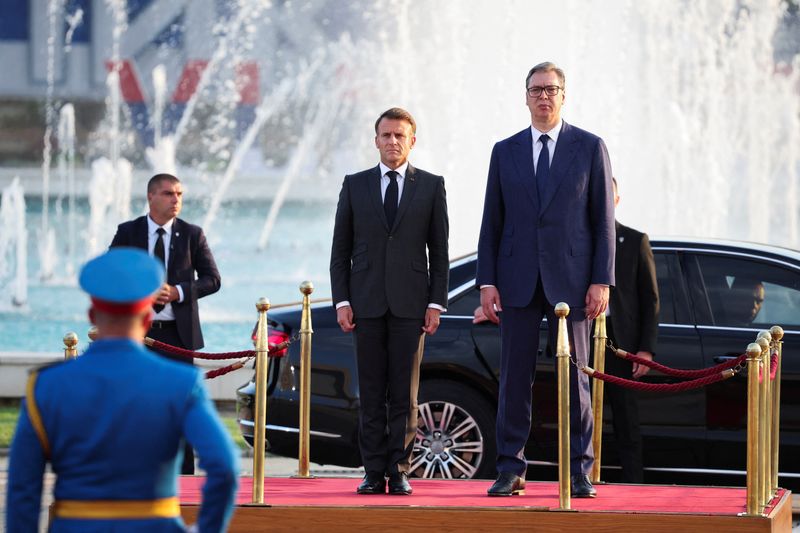France’s Macron visits Serbia to boost EU ties, discuss Rafale deal
2024.08.29 12:47
By Aleksandar Vasovic
BELGRADE (Reuters) – France’s President Emmanuel Macron travels to Belgrade on Thursday to bolster ties with Serbia and bring it closer to the West, as the Balkan country juggles its European Union membership bid and close ties with Russia and China.
During his two-day visit, Macron and his counterpart, Serbia’s populist Aleksandar Vucic, plan to discuss issues including the purchase of France’s Rafale fighters, made by Dassault, as well as energy and artificial intelligence.
It will be Macron’s second meeting with Vucic this year and follows the visit of Chinese President Xi Jinping to Belgrade in May, highlighting Serbia’s strategic position on the edge of the EU, with ties to the east and west.
In an op-ed piece in Serbia’s pro-government Politika daily on Thursday, Macron wrote that Belgrade could maintain its independent posture “only under the auspices of the EU.”
“When war once again broke out on our continent, initiated by Russia, … the idea that Serbia could seek its own way in the eternal game of balancing between powers … is just an illusion.”
The EU remains Serbia’s single biggest investor and hundreds of thousands of Serbs work in Western-owned companies.
Late on Wednesday, Vucic said there were unresolved issues with the purchase of Rafale aircraft, estimated at around 3 billion euros ($3.34 billion).
“It is not a question of the price, it is a question of certain guarantees … we have been struggling with this for four days,” he told state RTS TV.
DEPENDENT ON RUSSIAN GAS
Aleksandar Zivotic, a history lecturer at the Belgrade University, described the aircraft sale as a “historical and political departure from Soviet-Russian influence.”
“Such a military technology is not only bought with money, but with foreign policy position pledges,” he said.
Belgrade curtailed military cooperation with Moscow after Russia invaded Ukraine and it has condemned the invasion, but unlike the EU and other Western countries, it has not imposed sanctions on Moscow.
Serbia’s military and air force are loosely based on Soviet technology, but it has also purchased helicopters and transport planes from Airbus, radars from Thales and France’s Mistral surface-to-air missiles.
Belgrade, which seeks to diversify its gas supplies, is dependent on Russian gas and has the Kremlin’s support in its opposition to the 2008 independence of Kosovo.
Vucic said he and Macron would tackle cooperation in the fields of energy and artificial intelligence and that the two countries would sign a number of corresponding agreements.

Before it joins the EU, Serbia would have to improve democracy, the rule of law and judiciary, root out corruption, red tape and organised crime, and align its foreign policies with those of Brussels, including the introduction of sanctions against Russia.
($1 = 0.8988 euros)








